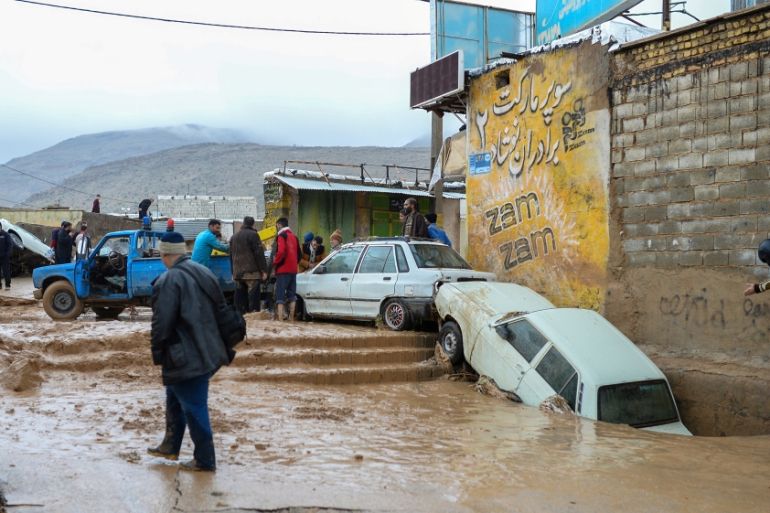Iran: Deadly floods highlight need for ‘natural disasters’ fund
Despite flooding that has killed 70, Iran’s efforts to establish an insurance fund are hampered by a lack of resources.

Tehran, Iran – As Iranians continue to deal with the aftermath of deadly floods across the country and the government scrambles to provide relief, the need for a natural disasters insurance fund is once more deeply felt.
Since mid-March, massive floods have hit 26 of Iran’s 31 provinces, leaving at least 70 dead. They have forced evacuations, ravaged infrastructures, and incurred heavy losses on the agriculture sector.
The government of President Hassan Rouhani has been mounting relief efforts, enlisting the help of the cash-strapped banking system in the form of cheap or interest-free loans.
The growing but underdeveloped insurance sector has also quickly started reimbursing for damage, while municipalities in some areas hit hardest by the floods provided insurance coverage for local citizens.
|
|
However, as might have been predicted under current harsh economic conditions amplified by US sanctions, the annual budget was never going to be enough to cover the hefty damages.
Left with no other choice, officials are mulling withdrawal of as much as two billion euros ($2.25bn) from the country’s already strained sovereign wealth fund.
This has suddenly revived a long-standing discussion surrounding the formation of a nation-wide natural disasters insurance fund and whether Iran’s response to the floods would have been different if such a fund had been in place.
“I call on all relating entities to regard the bill to establish a natural disasters insurance fund much more seriously as it can be very consequential,” Gholamreza Soleimani, head of Central Insurance of Iran, said in a speech last week.
“The recent floods are a serious warning for occurrence of natural disasters in the country and the more serious measures that need to be adopted to contain them,” he said.
The idea of establishing such a fund was first floated 16 years ago. It has since been going back and forth within Iran’s complicated and time-consuming legislative apparatus.
‘Unfounded expectations’
The bill for the formation of the fund was last in the spotlight in November 2017 when a massive 7.3 magnitude earthquake shook the western parts of Iran. That catastrophe killed more than 600 and left much devastation, some of which has yet to be repaired.
![There has been unprecedented flooding across most of the country since mid-March with 70 people killed, according to the country's emergency services [Hossein Mersadi/AFP]](/wp-content/uploads/2019/04/a37ebd734d6b4eef89f2b95c51db281e_18.jpeg)
At the time, then-Head of Central Insurance Abdolnasser Hemmati, who currently sits at the helm of the Central Bank of Iran, highlighted the bill and called for its immediate passage through government and parliament.
The main mandate of the envisioned fund was to accelerate renovation and rebuilding the houses that are affected by earthquakes, floods and other natural disasters.
|
|
“More than 85 percent of residential units are not currently covered by fire insurance, the type of insurance that also contains earthquake coverage,” Hemmati said in 2017.
The fund was slated to contain mandatory insurance policies in addition to a host of optional features to better cover flood, earthquake, hurricane, lightning and tsunami damages. Central Insurance had also proposed making fire insurance policies mandatory across the country.
The bill was fast-tracked and managed to receive a green light from the parliament.
However, the Guardian Council, Iran’s top constitutional watchdog that needs to approve parliament-ratified legislation before they are turned into law, refused to pass the bill.
State of limbo
The 12-member body cited ambiguities concerning the resources of the fund, arguing that the Rouhani government needs to own up to the expenses and formally commit to providing them.
Facing a widening budget deficit, the government declined, leaving the bill in a state of limbo with no sign of a breakthrough in sight.
The fund has no chance of being established until the Guardian Council is appeased. Members of parliament have therefore been pushing the government, but to no avail.
“The government says the bill must be approved as was presented and there is no need for new resources to be injected to the fund, but the parliament believes the fund will fall short without new resources,” Farid Mousavi, a member of the parliament’s economic commission told the Persian-language daily newspaper Aftab-e Yazd.
“An ineffective fund would only create unfounded expectations for the people, which could end up doing more damage than good,” the Tehran MP added.
Rouhani has already faced criticism over delayed or otherwise lacklustre relief efforts. His administration, on the other hand, has pointed out that US sanctions have prevented a flow of foreign financial aid, a claim that was corroborated by the Iranian Red Crescent.
So Rouhani will likely continue to redirect resources towards more immediate concerns.
Despite many natural disasters over the decades, costing the lives of citizens and billions of dollars in damages, Iran may postpont the establishment of a natural disasters insurance fund to a time when the government’s resources are not so constrained.